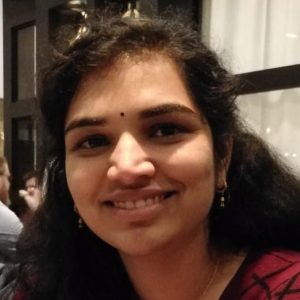Niharika D’Souza
Talk Title: Mathematical Models of Brain Connectivity and Behavior: Network Optimization Perspectives, Deep-Generative Hybrids, and Beyond
Talk Abstract: Autism Spectrum Disorder (ASD) is a complex neurodevelopmental disorder characterized by multiple impairments and levels of disability that vary widely across the ASD spectrum. Currently, quantifying symptom severity relies almost solely on a trained clinician’s evaluation. Recently, neuroimaging studies, for example, using resting state functional MRI (rs-fMRI) and Diffusion Tensor Imaging (DTI) have been gaining popularity for studying brain dysfunction. My work aims at linking the symptomatic characterization of ASD with the functional and structural organization of a patient’s brain via machine learning. To set the stage, I will first introduce a joint network optimization to predict clinical severity from rs-fMRI data. Our model is couples two terms: a generative matrix factorization and a discriminative regression in a joint optimization. Next, we extend this to a deep-generative hybrid, that jointly models the complementarity between structure (DTI) and functional dynamics (dynamic rs-fMRI connectivity) to extract predictive disease biomarkers. The generative part of our framework is now a structurally-regularized matrix factorization on dynamic rs-fMRI correlation matrices, guided by DTI tractography to learn anatomically informed connectivity profiles. The deep part of our framework is an LSTM-ANN, which models the temporal evolution of the scan to map to behavior. Our main novelty lies in our coupled optimization, which collectively estimates the matrix factors and the neural network weights. We outperform several state-of-the-art baselines to extract multi-modal neural signatures of brain dysfunction. Finally, I will present our current exploration based on graph neural networks and manifold learning to better capture the underlying data geometry.
Bio: Niharika is a PhD candidate in the department of Electrical and Computer Engineering. Her research interests lie at the intersection of deep learning, non-convex optimization, manifold learning and graph signal processing applied to neuroimaging data. She has developed novel machine learning algorithms that predict behavioral deficits in patients with Autism by decoding their brain organization from their functional and structural neuroimaging scans. Prior to joining Hopkins, she obtained a bachelor’s degree (B. Tech with Hons.) in Electrical Engineering with a minor in Electronics and Electrical Communications Engineering from the Indian Institute of Technology, Kharagpur.
